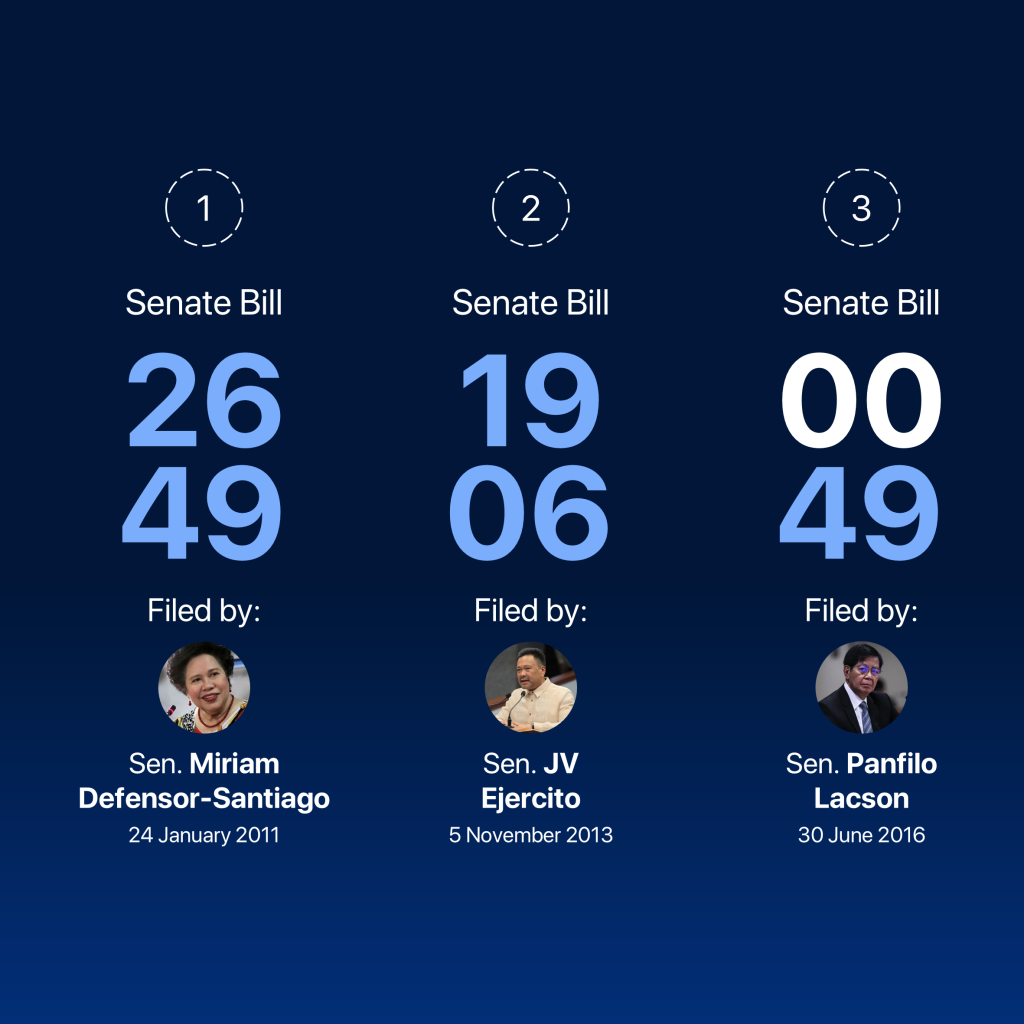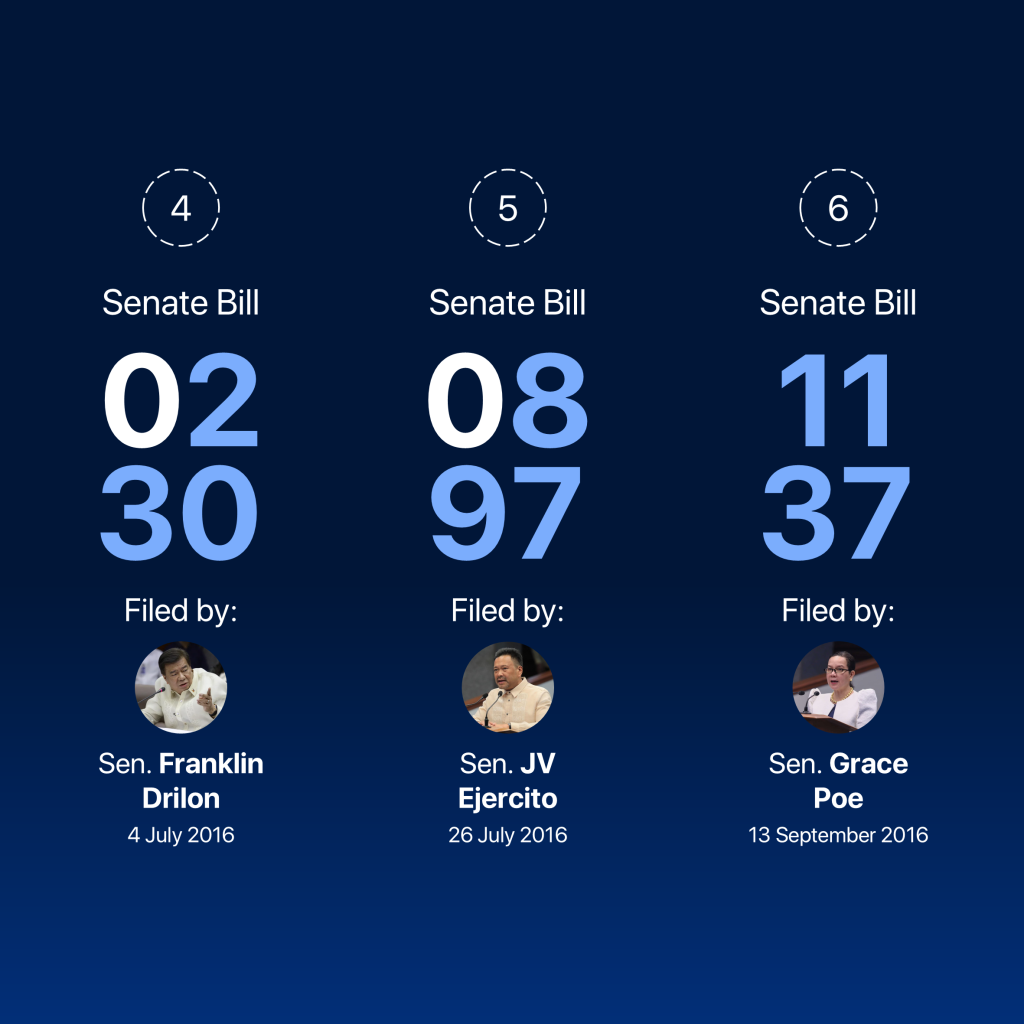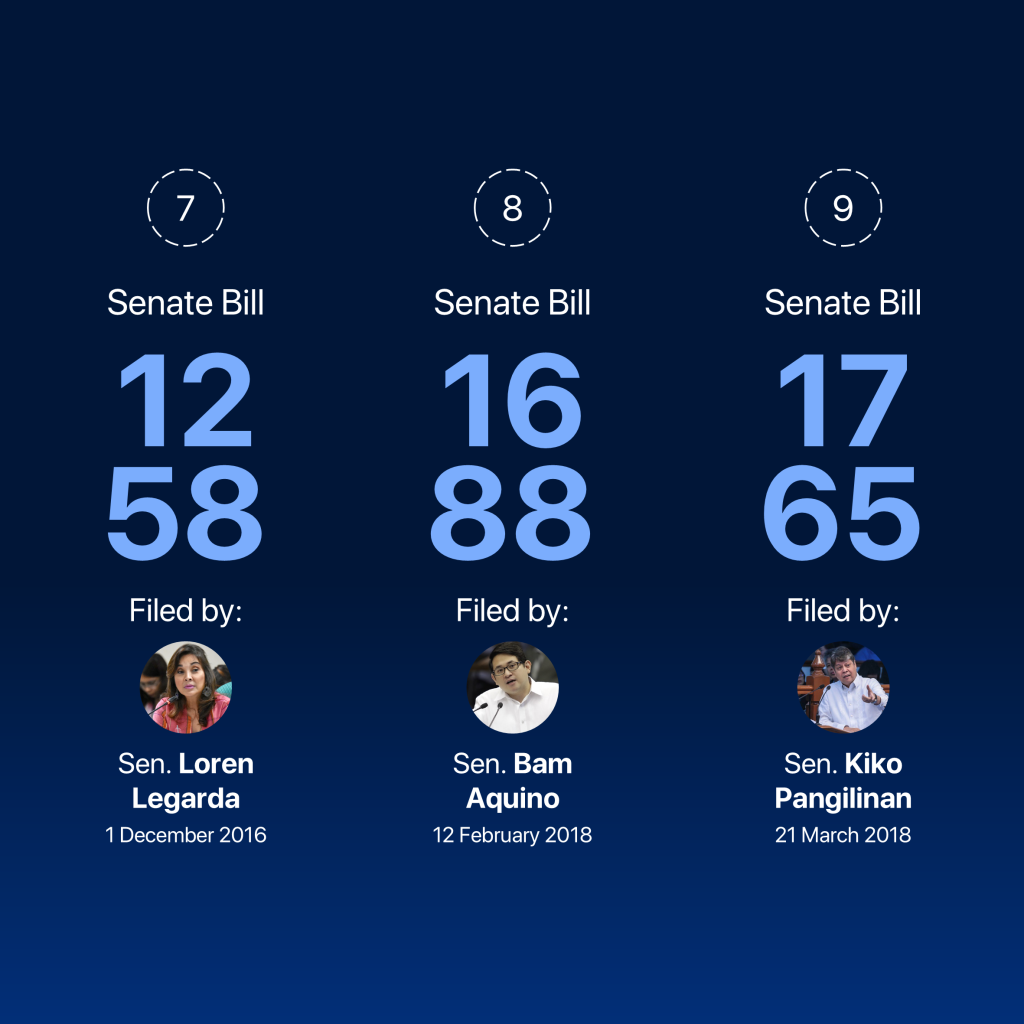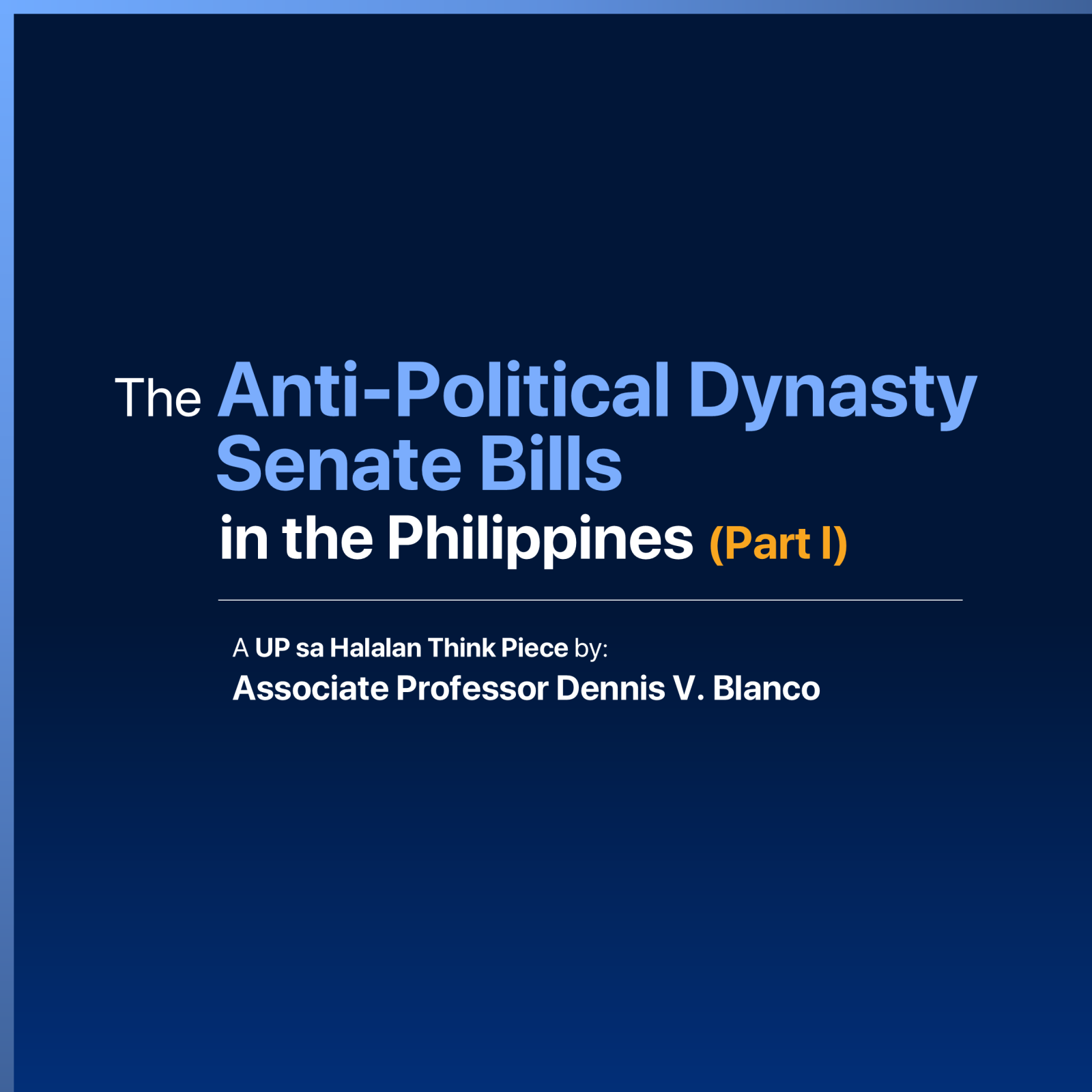This article analyzes the evolution of the legislative attempts of anti-political dynasty bills filed in the Senate of the Philippines from the 13th Congress of the Philippines to the 17th Congress of the Philippines. It will also attempt to offer a comparative critique of these anti-political dynasty bills placing emphasis on the various senate bills point of convergence and divergence in terms of its following components:
a) senate bill number assigned;
b) date filed and author or authors;
c) explanatory note
d) title of the bill
e) declaration of policy
f) definition of political dynasty
g) definition of political dynasty relationship.
It must be emphasized though that while these proposals were made during the past Congresses, future proposals can also be based on those previously filed given that it is a common practice in Congress.
Anti-Political Dynasty Senate Bills in the Philippines: 13th to 17th Congress



There are already nine (9) anti-political dynasty bills which are introduced and sponsored in the Senate of the Philippines namely SBN (Senate Bill Number) 2649, SBN 1906, SBN 44, SBN 230, SBN 897, SBN 1137, SBN 1258, SBN 1688, and SBN 1765. Bills are general measures, which if passed upon, may become laws. A bill is prefixed with S., followed by a number assigned the measure based on the order in which it is introduced. In terms of filing date and author, the late Senator Miriam Defensor Santiago filed the original and pioneering anti-political dynasty bill during the Thirteenth Congress and is refiled at the Fifteenth Congress on January 24, 2011. This was followed by Senator Joseph Victor Ejercito’s SBN 1906 which was filed at the Sixteenth congress on November 5, 2013. The latest and most recent anti-political dynasty bill is the SBN 175, which is a consolidated bill introduced by Senator Francis Pangilinan filed at the 17th Congress on March 21, 2018
With regards to the explanatory table below this article, the bills shares commonalities and disparities in the rationalization, motivation and justification on the passage of the bills. It consists of multifarious, multi-dimensional and multi-disciplinary general themes which employs a combination of social, economic, political and legal explanations, reinforced by specific topics relating to electoral sovereignty, political equality, electoral democracy, elite-dominated politics, poverty incidence, and absence of regulatory mechanism and evidenced by research literature and studies closely-related to political dynasty and its impact to the social, economic, political and legal underpinnings in the Philippine society. For example, SBN 2649 (Santiago) delves on the sociological dimension of the bill as its rational justification when it describes that, “ The monopoly of political power and public resources by such families affects the citizenry at the local and national levels” and tackle as well as the socio-economic impacts of political dynasty when it surmise that, “In many instances, voters, for convenience and out of cultural mindset look up to these ruling families as dispensers of favors, and thus elect relatives of these politically dominant families”.
SBN 1906 (Ejercito) focuses on political inequality when the bill mentioned the United Nations Development Program (UNDP) Report written by Temario Rivera (2011, p. 62) which revealed that, “of the 77 provinces included in the study, 72 provinces or 94 percent have political families. Further, the average number of political families per province is 2.31, meaning there are at least two political clans in most of the provinces”. SBN 49 (Lacson) on the other hand concentrates on providing a balancing act between electorate sovereignty and political dynasty by citing Commissioner Sarmiento during the debates in the 1986 Constitutional Commission about widening the electoral contest for the “competent, young and promising poor candidates to occupy important positions in the government”.
SBN 230 (Drilon) on its part, stresses electoral democracy and the causal relationship between dynastic concentration and the standard of living among the constituents and incorporated Balisacan and Fuwa (2003) findings that, “dynastic concentration have a significantly negative effect on the upliftment of local living standards, noting that lack of real political competition leads to flawed policies.” SBN 1137 (Poe) on the other hand puts emphasis on political inequality as well and relied on the research findings of Mendoza et al. (2012) which suggests that, “ 70 percent of the 15th Philippine Congress is considered dynastic. Eighty percent of the youngest congressmen (age 26-40) are from dynastic clans” and Mendoza et.al. (2014) conclusion that, “Dynasties dominate all of the major political parties”. SBN 1258 (Legarda) on its part, combines political inequality and poverty incidence as the bill’s primary agenda while reiterating the UNDP report written by Professor Temario Rivera (2011) and citing the Mendoza’s (2013) work on the correlation of poverty incidence and political dynasty which found out that, “that the more severe poverty is, the higher is the prevalence of political dynasties”.
Finally, SBN 1688 (Aquino) on its part laments the absence of a regulatory context mechanism which prohibits political dynasty and embraces the politico-legal dimension of political dynasty through the citation of Albert et al. (2015) on the political ramifications and social implications of an absence of an anti-political dynasty law to which states that, “Without an implementing law and no restrictions, political dynasties have come to occupy 70% of Congress. In Local Government Units, 85% of governors, 75% of vice-governors, and a large share of mayors (66%) and vice-mayors (50%) from outside the NCR were also revealed to be from dynastic families”. Albert et al. (2015) also argues that the passage of anti-dynasty law could bring about greater benefits to the people and society in terms of a) improving the quality of political parties by increasing to political participation, b) affording people with greater political access to political processes, c) strengthening democracy, d) promoting inclusiveness. SBN 1765 (Pangilinan) on the other hand, no longer contain explanatory notes for it is the consolidated version of all the bills in which explanatory notes are already made explicit and specific in the previous versions of the bill.
With regards to the short title of the bills, there are various titles given title such as Anti- Political Dynasty Act (SBN 2649, SBN 230, SBN 1688), Anti-Political Dynasty Act of 2013 (SBN 1906), Anti-Political Dynasty Act of 2016 (SBN 49, SBN 897, SBN 1137, SBN 1258), and Anti- Political Dynasty Act of 2018 (SBN 1765). It can be deduce that some senators seeks to retain the originality of the title regardless on the date and year it was filed to preserve the institutional memory of the original title the late Senator Miriam Defensor Santiago first conceptualize, while other senators choose to rename the title in accordance with the date and year it was filed to make as distinct as possible from its original title in which their respective versions contain some provisions which are a slight departure from its original and pioneering bill.
Dennis V. Blanco is Associate Professor at the Department of Political Science at UP Diliman. He was formerly Associate Dean of the College of Administrative and Financial Sciences at AMA International University Bahrain (now University of Technology Bahrain) and former Program Head of Political Science and Social Science in Colegio de San Juan de Letran-Manila.
Explanatory Table
| Senate Bill Number | Date filed/Author/s | Explanatory Note | Title | Declaration of Policy | Definition of Political Dynasty | Definition of Political Dynasty Relationship |
| SBN 2649 | January 24, 2011 Fifteenth Congress (This bill was originally filed in the First Regular Session of the Thirteenth Congress) Miriam Defensor Santiago | Sociological- The monopoly of political power and public resources by such families affects the citizenry at the local and national levels. Socio-Economic- In many instances, voters, for convenience and out of cultural mindset look up to these ruling families as dispensers of favors, and thus elect relatives of these politically dominant families. | The Anti-Political Dynasty Act | It is hereby declared the policy of the state to guarantee equal access and opportunity to public office and public service | Exists when a person who is the spouse of an incumbent elective official or a relative within the second civil degree of consanguinity or affinity of an incumbent elective official holds or runs for an elective office simultaneously with the incumbent elective official within the same province or occupies the same office immediately after the term of office of the incumbent elective official. It shall also be deemed to exist where two (2) or more persons who are spouses or are related within the second civil degree of consanguinity or affinity run simultaneously for elective public office within the same province or occupies the same office even if neither is so related to an incumbent elective official. | None |
| SBN 1906 | November 5, 2013 16th Congress First Regular Session Joseph Victor G. Ejercito | Social- The extended family system, an otherwise beneficial concept when applied to the social aspects of human behavior, has found its pernicious effects in the political arena where public office has become the exclusive domain of influential families and clans. Such families have become so well- entrenched in Philippine politics they have monopolized political power and public resources at all levels of government. | The Anti Political Dynasty Act of 2013 | It is hereby declared the policy of the state to guarantee equal access and opportunity to public office and service to the public | Concentration, consolidation or perpetuation of public office and political power by persons related to one another. | Exists when a person who is the spouse of an incumbent elective official or a relative within the second civil degree of consanguinity or affinity of an incumbent elective official holds or runs for an elective office simultaneously with the incumbent elective official within the same city and/or runs for an elective office simultaneously with the incumbent elective official within the same city and/or province or occupies the same office immediately after the term of office of the incumbent elective official. A political dynasty shall also be deemed to exist where two (2) or more persons who are spouses or are related within the second civil degree of consanguinity or affinity run simultaneously for elective public office within the same city and or/ province, even if neither is so related to an incumbent elective official. |
| SBN 49 | June 30, 2016 17th Congress First Regular Session Panfilo M. Lacson | Political- This proposed measure seeks to strike a balance between the two competing fundamental principles of electorate’s sovereignty and political dynasty. This Law is in consonance with the constitutional precept that laws should be interpreted not in the letter that killeth but to the spirit that vivifieth. | The Anti-Political Dynasty Act of 2016 | It is hereby declared the policy of the state to guarantee equal access and opportunity to public office and service to the public. | Concentration, consolidation or perpetuation of political powers by persons related to one another. | The situation where a person who is the spouse or a relative within the second civil degree of consanguinity or affinity of an incumbent elective officials holds or runs for an elective office simultaneously with the incumbent elective official within the same city and/or province or occupies the same office immediately after the term of office of the incumbent elective official. A political dynasty relationship shall also be deemed to exist where two (2) or more persons who ae spouses or related to one another within the second civil degree of consanguinity or affinity run simultaneously for elective public office within the same city and/or province or occupies the same office immediately after the term of office of the incumbent elective official. |
| SBN 230 | July 4, 2016 17th Congress First Regular Session Franklin M. Drilon | Political-democratizing the election process. Economic- A string of literature has shown a causal relationship between dynastic concentration and the standard of living among the constituents. . | The Anti-Political Dynasty Act | It is hereby declared the policy of the state to guarantee equal access and opportunity to public office and service to the public. | The concentration, consolidation or perpetuation of public office and political power by persons related to one another. | Exists when a person who is the spouse of an incumbent elective official or a relative within the second civil degree of consanguinity or affinity of an incumbent elective official holds or runs for an elective office simultaneously with the incumbent elective official within the same city and/or province or occupies the same office immediately after the term of office of the incumbent elective official. A political dynasty shall also be deemed to exist where two (2) or more persons who are spouses or are related within the second civil degree of consanguinity or affinity run simultaneously for elective public office within the same city and or/ province, even if neither is so related to an incumbent elective official. |
| SBN 897 | July 26, 2016 Refiled at the 17th Congress First Regular Session Joseph Victor G. Ejercito | Reiteration of SBN 1906 | The Anti Political Dynasty Act of 2016 | It is hereby declared the policy of the State to guarantee equal access and opportunity to public office and service to the public. | The concentration, consolidation or perpetuation of public office and political power by persons related to one another | Exists when a person who is the spouse of an incumbent elective official or a relative within the second civil degree of consanguinity or affinity of an incumbent elective official holds or runs for an elective office simultaneously with the incumbent elective official within the same city and/or province or occupies the same office immediately after the term of office of the incumbent elective official. A political dynasty shall also be deemed to exist where two (2) or more persons who are spouses or are related within the second civil degree of consanguinity or affinity run simultaneously for elective public office within the same city and or/ province, even if neither is so related to an incumbent elective official. |
| SBN 1137 | September 13, 2016 17th Congress First Regular Session Grace L. Poe | Political Inequality- There is a wealth of academic research and a whole collection of extensive articles that have been written on the evils of political dynasties | The Anti-Political Dynasty Act of 2016 | It is hereby declared the policy of the State to guarantee and provide equal access to opportunities for public office and public service to any qualified Filipino, pursuant to Section 26, Article II of the 1987 Constitution. | The concentration, consolidation and/or perpetuation of public office and political powers by persons related to one another within the second degree of consanguinity or affinity | Exist when the spouse or any relative within the second degree of consanguinity or affinity of an incumbent elective official, runs to public office to succeed or replace the incumbent, or runs for or holds any elective local office simultaneously with the incumbent within the same province, legislative districts, city or municipality, and within the same barangay or barangays within the same legislative district. The relationship also exists if the incumbent is a national elective official, and the spouse or relatives within the second degree of consanguinity or affinity run for any position in the national level or in the local level as mayor, governor or district representative in any part of the country. |
| SBN 1258 | December 1, 2016 17th Congress First Regular Session Loren B. Legarda | Political- A report by the United Nations Development Programme written by Temario Rivera (2011) revealed that 72 out of the 77 provinces included in the study, or 94 percent, have political families. In the Seventeenth Congress alone, about two- thirds of the outgoing members are members of political families. Economic-Pragmatically, studies show that high poverty incidence directly correlates with the presence of political dynasties. In a study conducted by Ronald Mendoza et al. (2013) of Asian Institute of Management (AIM), those jurisdictions where dynasties prevail the most have a higher incidence of poverty, lower index of human development, and lower standards of living. | The Anti-Political Dynasty Act of 2016 | It is hereby declared the policy of the State to guarantee equal access and opportunity to public office and service to the public. | The concentration, consolidation or perpetuation of public office and political power by persons related to one another | Exists when a person who is the spouse of an incumbent elective official or a relative within the second civil degree of consanguinity or affinity of an incumbent elective official holds or runs for an elective office simultaneously with the incumbent elective official within the same city and/or province or occupies the same office immediately after the term of office of the incumbent elective official. |
| SBN 1688 | February 12, 2018 17th Congress Second Regular Session Paolo Benigno Aquino IV | Politico-Legal Without an implementing law and no restrictions, political dynasties have come to occupy 70% of Congress. In Local Government Units, 85% of governors, 75% of vice-governors, and a large share of mayors (66%) and vice-mayors (50%) from outside the NCR were also revealed to be from dynastic families (Albert et al. 2015) | The Anti-Political Dynasty Act | It is hereby declared the policy of the State to guarantee equal access and opportunity to public office and service to the public. | The concentration, consolidation or perpetuation of public office and political power by persons related to one another | Exists when a person who is the spouse of an incumbent elective official or a relative within the third civil degree of consanguinity or affinity of an incumbent elective official holds or runs for an elective office simultaneously with the incumbent elective official within the same city and/or province or occupies the same office immediately after the term of office of the incumbent elective official. A political dynasty shall also be deemed to exist where two (2) or more persons who are spouses or are related within the third civil degree of consanguinity or affinity run simultaneously for elective public office within the same city and or/ province, even if neither is so related to an incumbent elective official. |
| SBN 1765 | March 21, 2018 17th Congress Second Regular Session Francis Pangilinan | Socio-Economic, Politico-Legal Consolidated Bill. No Explanatory Note | The Anti-Political Dynasty Act of 2018 | It is hereby declared the policy of the State to guarantee and provide equal access to opportunities for public office and public service to any qualified Filipino, pursuant to Section 26, Article II of the 1987 Constitution. | The concentration, consolidation and/or perpetuation of public office and political powers by persons related to one another within the second degree of consanguinity or affinity | Exist when the spouse or any relative within the second degree of consanguinity or affinity of an incumbent elective official, runs to public office to succeed or replace the incumbent, or runs for or holds any elective local office simultaneously with the incumbent within the same province, legislative districts, city or municipality, and within the same barangay or barangays within the same legislative district. The relationship also exists if the incumbent is a national elective official, including incumbents in the party-list system, and the spouse or relatives within the second degree of consanguinity or affinity run for any position in the national level or in the local level as barangay captain, mayor, governor or district representative in any part of the country. |
